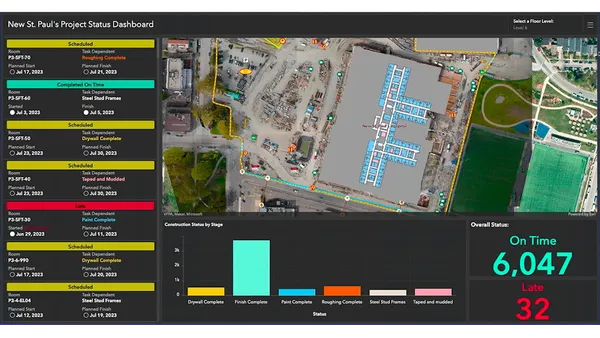Still relying heavily on desktop computers and traditional spreadsheets, the construction field lags behind other industries in productivity, a pair of technology experts said in reports published this week.
“The construction industry has had trouble increasing or even maintaining productivity in the field,” Josh Newland, group product manager at Procore, a provider of cloud-based construction software, wrote in Construction Executive magazine. He pointed to a California Polytechnic State University professor's analysis that showed other industries have averaged 200% production increases over the last 40 years, as they have done a better job than contractors of leveraging technology.
Apps to the rescue
The solution, Mobilengine CEO Adam Dalnoki wrote in a separate column in the magazine, is a greater use of apps by mobile construction crews whose work takes them into the field and away from traditional computers.
Contractors — 72% of whom already use smartphones and half of whom use tablets on the job, according to a Texas A&M survey — are not using the technology to its potential, Newland said.
He encouraged them to consider those smart devices a “mobile office” that, when loaded with cloud-based software and mobile apps, can save them from “run[ning] from the jobsite to the office to the trailer to access the information they need to keep projects moving.”
Newland said apps are already available that allow a contractor on a job site to view purchase orders, floor plans and site plans; schedule appointments; submit change orders; take photos and send them to clients or bosses; look up building codes and manufacturers’ instructions; track weather, which could determine what time of day the work will get done; sign off on paperwork; contact other crew members; and make calculations.
Job-specific tech
Dalnoki agreed, and suggested the following types of mobile construction apps for contractors in the field:
- Permit apps make it easy to send and receive building permits, which can shave hours or even days off of a project.
- Resource tracking apps save administrators from having to visit job sites to keep track of construction assets.
- Inventory apps enable project managers and the back office to know what stock is onsite at any given time.
- Fleet tracking apps indicate the status of deliveries en route and can reduce labor and fuel costs by up to 20%.
- Safety apps let on-site crews quickly notify managers of problems.
Dalnoki noted that execs at many construction companies are unaware of the breadth of mobile apps available specifically for use on job sites. If they knew about the technology, Newland wrote, they would embrace it.
“The industry is already answering the call to be more productive, efficient and connected while in the field,” as more workers use technology to get information in an instant, Newland said. “That trend is not going not change anytime soon.”
Where the apps are
Construction-related apps are easy to download from the Google Play store, Amazon and iTunes. And to weed through the flurry of new apps coming on the market, look for "best" lists published by tech writers.
Wisconsin construction publication The Daily Reporter, for example, reviewed industry-relevant apps earlier ths year and came up with a list of 15 that contractors have found useful on job sites.
Among its top picks: Construction Manager, which can be used for estimates, daily logs and calculations. The site noted that more than half a million of the apps have been downloaded, presumably by contractors.
Others among its Top 5: Viewpoint for Mobile, which has a familiar spreadsheet format and lets users track productivity and take photos. The device then automatically tags the photos with date, location and job code; Fieldwire, a planning app that allows foremen and project managers to collaborate in the field; iSafe Inspections, which automates forms like work orders and inspections like safety audits; and Safety Meeting App, which stores records electronically and complies with the U.S. Occupational Safety and Health Administration's meeting laws.
Education site Construction Knowledge keeps a running list of new construction apps and allows users to post reviews. Contractors can search for apps that are organized in 15 categories — like site work and civil engineering, concrete, carpentry and roofing — to find one that suits their needs. The site explains what each app does and whether it's free. App vendors post their pitches on the site, and users hold nothing back in their in their reviews.
Another useful site for app research is Nubera, a buyer's guide that compiles information and reviews on a wide variety of business apps and claims to have two million users a month. It published its latest list of "10 Best Cloud Construction Apps" in July. It recommended Procore as a "one stop stop" for budgeting, document and contract management, bidding and email tracking; and Synchroteam, an app for scheduling, dispatching and tracking. Also among its Top 5: Corecon V7, designed just for the construction field, which makes back-office operations mobile; Co-construct is for custom builders; and BuilderTrend, which helps homebuilders with estimating, tracking progress and customer relationship management.
A tip: While searching for apps online, note the date of the review to ensure that you download the most up-to-date version.
How to start
Newland suggested three ways that construction administrators can nudge mobile crews toward the adoption of apps:
- Bring your own. Because approximately six out of every 10 crew members already own smartphones or tablets, Newland advised managers to allow — and encourage — employees to bring them to work. For those who don’t own the devices — or to control the spread of sensitive company information — firms can supply each mobile worker with a smart device, from phones to tablets to wristwatches.
- Outlaw paper. A companywide mandate to replace paper documents with digital versions that can be shared via email, text or app will force reluctant adopters to at least try the technology. Once a superintendent learns, for example, that using a daily log app can shave half an hour a day from the task of summarizing a shift’s activities, the habit will sell itself. Daily log apps allow the foreman to plug in progress as it occurs during the day, eliminating the need to devote concentrated time to the chore.
- Centralize all info. Construction firms that use project management software compile and regularly update project data, requests for information, change orders, drawings and punch lists in one virtual location. Crews can use their smart devices to tap that data when they need it — without the frustration of searching for it or asking someone at the office to look it up for them.
Truly mobile work crews have “real-time connectivity,” which Dalnoki notes “can greatly improve a construction company’s productivity."





















